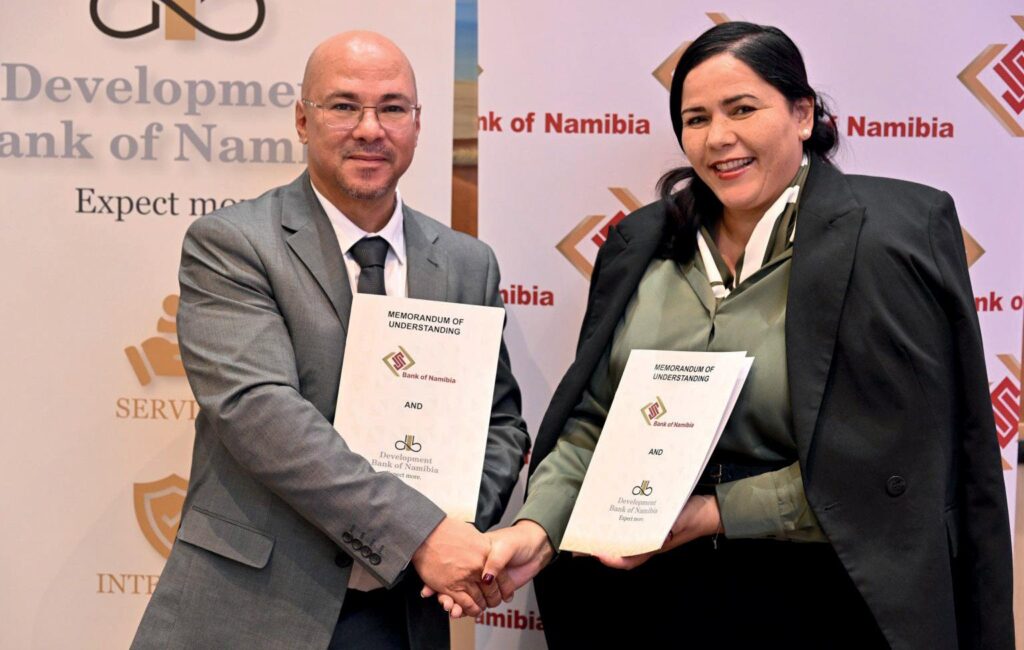
BON AND DBN FORGE PARTNERSHIP TO BOOST NAMIBIA’S ECONOMIC GROWTH
The Bank of Namibia (BoN) and the Development Bank of Namibia (DBN) have signed a three-year Memorandum of Understanding (MoU) to bolster economic growth and development in Namibia.
The agreement, signed on Monday, aims to leverage the combined expertise and resources of the BoN and DBN to achieve sustainable economic development and social welfare for Namibians.
The MoU establishes a framework for cooperative engagement, facilitating collaboration on initiatives that promote economic growth and development in Namibia, which includes sharing relevant data and information, conducting joint research, organising economic seminars, and working on projects that address specific developmental challenges.
“This collaboration marks a significant milestone in our shared commitment to fostering economic growth and sustainable development across our nation. By leveraging our combined resources and expertise, we aim to create a robust financial ecosystem that supports innovative projects, empowers small and medium enterprises, and drives inclusive economic progress. Together, we are poised to make a lasting impact on Namibia’s economic landscape, ensuring prosperity and opportunities for all Namibians,” said DBN CEO, John Steytler.
Leonie Dunn, Deputy Governor of the BoN, said the MoU represents more than just a partnership on paper; it reflects a shared vision of fostering economic growth, supporting sustainable development, and addressing developmental challenges in Namibia.
“Our collaboration embodies the spirit of unity and progress, as we leverage our combined expertise to strengthen the resilience of our economy and deliver meaningful impact. Together, we will go far,” she said.

MASS HOUSING DELIVERS 4,446 UNITS IN 10 YEARS
Namibia’s Mass Housing Development Programme has completed and handed over 4,446 housing units across various regions, the Minister of Urban and Rural Development, Erastus Uutoni, has revealed.
The Mass Housing Development Programme was adopted by the Cabinet in 2013 and the Programme implementation started in 2014. The Minister highlighted this achievement during a ceremony marking the handover of 119 newly completed houses at Swakopmund. Uutoni expressed pride in the progress made, particularly noting the recent completion of 319 houses ahead of schedule despite previous challenges.
“I wish to commend the contractor, New Era Investments, and our dedicated government team for their relentless efforts in achieving this milestone,” stated Uutoni during his address.
He said the completion of these houses represents a significant step forward for the programme, which has faced setbacks including legal disputes and funding challenges.
“We are aware of the challenges that delayed some projects, such as the legal dispute that affected 505 houses at this site in Swakopmund. However, through perseverance and collaboration, we have managed to resolve many of these issues,” Uutoni said.
The Minister outlined the government’s commitment to completing the remaining 572 units that are currently in various stages of completion.
“We are prioritising the resolution of outstanding issues, including the dispute affecting 186 houses here in Swakopmund, as well as projects in Windhoek and Opuwo,” he affirmed. Regarding plans, Uutoni emphasised the government’s dedication to addressing housing needs across all income groups.
“We are fully aware that we need to do more to meet the needs for decent and affordable housing for all our people. In this connection, the Cabinet approved the revised National Housing Policy with a 5-year Implementation Action Plan in November last year,” he explained.
The Policy seeks to reinforce and scale up ongoing collaborative actions and partnerships between the Government, community-based organisations and the private sector.
It gives special attention to improving conditions in informal settlements and meeting the housing needs of ultra-low, low and middle-income groups, which constitute approximately 88% of the population in need of affordable land and decent housing.
“We are finalising the launch of this policy and its implementation plan to further enhance our efforts in providing decent and affordable housing,” the Minister added.

CONSTRUCTION SECTOR EMPLOYEES SET FOR 9% MINIMUM WAGE INCREASE
Construction Industries Federation of Namibia (CIF) and the Metal and Allied Namibian Workers Union (MANWU), have reached a two year wage agreement which will see a 5% wage increase in the first year and an additional 4% increase in the adjusted minimum wage in the second year.
CIF CEO Bärbel Kirchner said the increment was effective upon the publication of the Collective Agreement which happened on the 6th of June and outlines the two-year period of regulated wages and employment practices.
“That would mean that in the first year, the minimum wage payable for an unskilled labourer will be N$18.72 and in the second year N$19.46. All other conditions of employment mostly remain the same as in the previously gazetted Collective Agreement,” Kirchner said
Kirchner further emphasised the importance of a level playing field within the industry, ensuring all construction businesses adhere to the minimum wage standards.
The transparency, she argues, strengthens fair labour practices and eliminates potential disadvantages for CIF members who previously adhered to these terms.
“For us, it is important that the implementation date of the agreement is on the day the Collective Agreement is published in the Government Gazette. This will prevent our members are disadvantaged before the date of promulgation; i.e. only they would have to adhere to the conditions. Now that the Collective Agreement is gazetted, every single business in the construction sector would have to adhere to it,” she said.
She also highlighted that the minimum wage increase applies only to designated worker categories and does not guarantee automatic wage increases for all employees within those categories.
The CEO said employers who already offer wages exceeding the minimum wage, are not obligated to adjust salaries based on this agreement.
“It is important to note that the increase of the minimum wage payable, is not an increase across the industry. It is only an increase of the minimum wage payable for the categories of employees as listed in the Collective Agreement,” she said.







